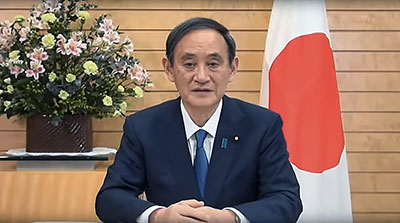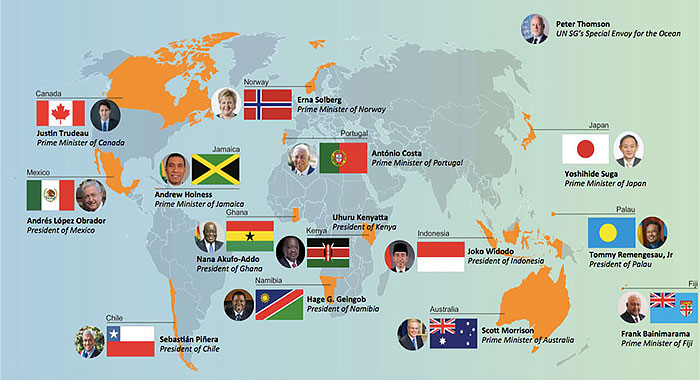- Top
- Publications
- Ocean Newsletter
- Promoting Sustainable Ocean Economies and International Partnership –An International Webinar Video Message–
Ocean Newsletter
No.490 January 5, 2021
-
Promoting Sustainable Ocean Economies and International Partnership –An International Webinar Video Message–
SUGA Yoshihide
Prime Minister of Japan
Selected Papers No.26The “High Level Panel for a Sustainable Ocean Economy,” comprised of world leaders from 14 countries, including Japan, and 15 Special Envoys of the Secretary-General of the United Nations, was established in 2018 to stimulate the economy through the conservation and sustainable use of the ocean. The “Ocean Panel’s Policy Recommendations: Promoting Sustainable Ocean Economies and International Partnership” international webinar was hosted to widely publicize the summit report released as a product of the Panel’s work. This article is the video message delivered by Prime Minister Suga Yoshihide for the international webinar.
Selected Papers No.26 -
Towards a “Transformative” Decade of Ocean Science
MAKINO Mitsutaku
Professor, International Advanced Research Division, Atmosphere and Ocean Research Institute, The University of TokyoAs January 2021 marks the start of the United Nations Decade of Ocean Science for Sustainable Development (UNDOS), research institutions and researchers worldwide are cooperating in an effort to advance ocean science. UNDOS presents the following societal outcomes in its vision for the “ocean we want”: a clean ocean, a healthy and resilient ocean, a productive ocean, a predictable ocean, a safe ocean, an accessible ocean, and an inspiring and engaging ocean. A “transformative” approach to ocean science will be needed to realize this vision. -
The Case of the Diamond Princess Cruise Ship and the Role of Japan
SAKAMOTO Shigeki
Professor, Doshisa University
Selected Papers No.26The February 2020 outbreaks of COVID-19 on the Diamond Princess cruise ship revealed the conflict between the national legal interests of coastal states in preventing the spread of infections and international legal interests in maintaining the stability of maritime traffic. As there are many issues that cannot be resolved alone by the port state where a ship has called, and as international cooperation between a vessel’s flag state and its operators’ country is crucial, new international rules need to be established.
Selected Papers No.26 -
Transforming Fisheries into a Growth Industry with Fishermen
MIYAHARA Masanori
President, Japan Fisheries Research and Education AgencyThe Japanese government has been pushing for a “fishery reformation” since 2018, endeavoring to grow Japan’s fisheries while also facing food-supply crises and territorial disputes. The Japan Fisheries Research and Education Agency conducted large-scale organizational restructuring in the summer of 2020 under these policies. I hope to continue producing results, together with fishermen, in tackling the two issues of restoring fisheries resources and growing the fishing industry.
Promoting Sustainable Ocean Economies and International Partnership –An International Webinar Video Message–
The “High Level Panel for a Sustainable Ocean Economy,” comprised of world leaders from 14 countries, including Japan, and 15 Special Envoys of the Secretary-General of the United Nations, was established in 2018 to stimulate the economy through the conservation and sustainable use of the ocean. The “Ocean Panel’s Policy Recommendations: Promoting Sustainable Ocean Economies and International Partnership” international webinar was hosted to widely publicize the summit report released as a product of the Panel’s work. This article is the video message delivered by Prime Minister Suga Yoshihide for the international webinar.
 Prime Minister Suga delivers a video message at the December 3rd, 2020 international webinar, “Ocean Panel’s Policy Recommendations: Promoting Sustainable Ocean Economies and International Partnership.”
Prime Minister Suga delivers a video message at the December 3rd, 2020 international webinar, “Ocean Panel’s Policy Recommendations: Promoting Sustainable Ocean Economies and International Partnership.”
We, the leaders of the 14-member ocean states of the High-Level Panel for a Sustainable Ocean Economy, have released a leaders’ document entitled “Transformations for a Sustainable Ocean Economy.” It is the first attempt to formulate a leaders’ statement by the High-Level Panel that comprehensively addresses the issues of conservation and sustainable use of the ocean.
We would like to express our profound respect to Prime Minister Erna Solberg of Norway and President Tommy Remengesau Jr. of the Republic of Palau for their leadership. Japan has now adopted its 4th Basic Plan on Ocean Policy, which is aligned with the leaders’ statement, and is making efforts towards building a sustainable ocean economy.
Under this plan, Japan is committed to sustainably managing the ocean areas under its jurisdiction in order to ensure that future generations can benefit from flourishing ocean resources. We plan to further advance these efforts. To realize a sustainable ocean economy, we must take ambitious actions toward mitigating climate change, such as through leveraging ocean-based renewable energy. My administration has declared that by 2050 Japan will aim to reduce greenhouse gas emissions to net-zero and realize a carbon-neutral society. By accelerating a virtuous cycle of the economy and the environment through innovation, and capitalizing upon the potential of the ocean, such as through offshore wind power generation, Japan will lead international efforts to achieve the decarbonized world aimed at by the Paris Agreement.
In our view, collaborating with the international community on the issue of marine plastic litter is also indispensable toward facilitating ocean conservation. Japan launched the “Osaka Blue Ocean Vision” at the G20 Osaka Summit last year. The Vision aims to reduce additional pollution by marine plastic litter to zero by 2050. To realize this Vision, Japan will actively tackle this problem with relevant partner organizations, such as the International Environmental Technology Centre of the United Nations Environment Programme (UNEP-IETC) headquartered in Osaka and facilitate technical assistance to developing countries.
It is my hope that this leaders’ document will serve as a compass toward building a sustainable ocean economy and lead to concrete actions in passing on our flourishing ocean resources to future generations.
*Explanatory Note: The High-Level Panel for a Sustainable Ocean Economy (Figure 1) was established in 2018 under the leadership of the Norwegian government to tackle a variety of ocean issues verging on crisis, such as depleting fishery resources, rising ocean temperatures, and increasing marine plastic litter, as well as to stimulate the economy through the conservation and sustainable use of the ocean. The Panel is comprised of world leaders from 14 countries and United Nations Secretary-General’s Special Envoy for the Ocean, including: Prime Minister Suga Yoshihide who replaces former Prime Minister Abe Shinzo. Prime Minister Suga Yoshihide joined the High-Level Panel as a member in the autumn of 2020. The outcome of the 3 years of activities was synthesized as a policy recommendation document and released as a leaders’ statement on December 2, 2020 (https://www.oceanpanel.org/ocean-action/transformations.html).
In order to widely disseminate the leaders’ statement, on December 3, 2020, the international webinar “Ocean Panel’s Policy Recommendations: Promoting Sustainable Ocean Economies and International Partnership” was co-organized by the Ministry of Foreign Affairs of Japan and The Ocean Policy Research Institute, The Sasakawa Peace Foundation in cooperation with the Embassy of the Republic of Palau and the Embassy of Norway in Japan (for a summary of the event, see https://www.spf.org/opri/en/blogs/event-report/20201215.html).
The above text is based on the video message delivered by Prime Minister Suga Yoshihide for the international webinar, with editorial adjustments by OPRI-SPF.
 Figure 1: Members of the High-Level Panel for a Sustainable Ocean Economy
Figure 1: Members of the High-Level Panel for a Sustainable Ocean Economy
(Excerpt from the document of the Secretariat for the High-Level Panel)

